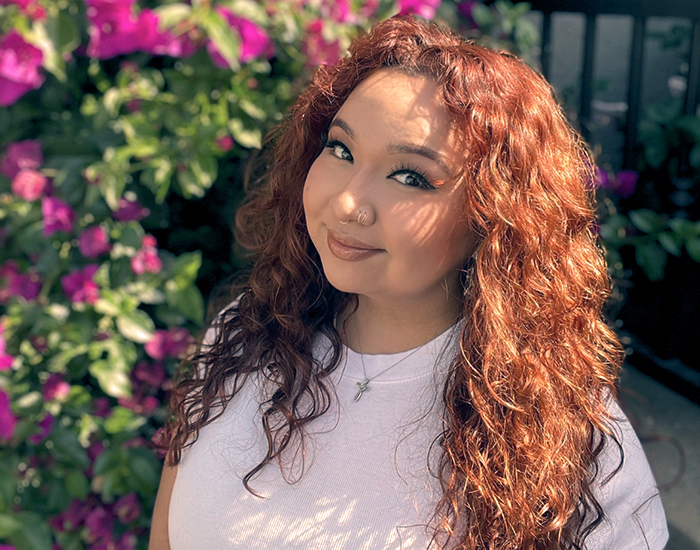Often when one door closes, another opens. This was the case for Keck Graduate Institute student Allyssa Gomez, MSCM ’23, whose plan to take the MCAT and apply for medical school coincided with the COVID-19 pandemic’s start.
Gomez was born and raised in Fresno, graduating from Fresno State with a bachelor’s in biology in December 2019. During her time as an undergraduate, she was affiliated with multiple organizations, including the Health Career Opportunities Program (HCOP).
“Being involved in that program opened many doors for me as a pre-med student—including an internship—and even my current position as a scribe for the Community Regional Medical Center,” Gomez said.
During her internship with Health Career Connection, she was paired with the Area Health Education Centers, which is housed in the University of California San Francisco Fresno’s Family and Community Medicine Department. This was her first introduction to community medicine and public health.
“Being in a major like biology can be very rigorous and science-intensive; it was nice to explore different subjects related to medicine that I have since grown to appreciate,” Gomez said.
Upon graduation, she took a few months to study for the MCAT and planned to take the test in May of 2020. However, her test got canceled twice due to COVID-19 restrictions.
“It was a tough time,” Gomez said.
Eventually, she decided to withhold her application. At the same time, she sought out other opportunities to get involved in her community.
This led her to an AmeriCorps CSU STEM VISTA position, where she worked closely with STEM majors within the College of Science and Mathematics at Fresno State. Most of the students she worked with were first-generation Americans from underserved populations.
“During that time, I provided many mentorships to students from my community, but I also received many mentorships as well,” Gomez said.
Every Friday, Gomez and other volunteers would attend workshops that prepared them for careers in the medical field and for the process of applying to medical school and other graduate and professional programs.
“This idea of applying to a graduate program was already in my head—like the seedling had been planted—and it continued to be watered,” Gomez said.
As an undergraduate, she was also involved with the organization MiMentor, which held a Q&A panel with the leaders of KGI’s groundbreaking new two-year online Master of Science in Community Medicine (MSCM) program.
“I was intrigued with the program and their commitment to equipping students with the skills and knowledge to return to their communities and help underserved populations, which I want to do,” Gomez said.
She had planned to pursue her master’s after completing her third year of medical school. Given the circumstances, though, she decided it would be best to attend KGI first. Now her first year in the inaugural MSCM program is nearly complete.
“Even though the program is completely online, I’ve been able to find friends that I feel will be my lifelong friends,” Gomez said. “Also, the courses have been very eye-opening when it comes to chronic and infectious diseases and how we, as future healthcare providers, can give back to our community.”
She is looking forward to her capstone project.
“There is an opioid epidemic among residents here in the Central Valley and heavy methamphetamine use,” Gomez said. “When I worked in a Level One trauma center in downtown Fresno, I saw many patients with substance overdose. So, I’m interested in potentially partnering with community programs to educate the Central Valley population on how to administer Naloxone properly and to direct them toward resources to help them stop using substances.”
In the MSCM program, Gomez has learned how to build trust and rapport within the community and be an effective communicator.
“I feel like these skill sets can transcend beyond community medicine and into other practices that I intend to pursue later in my career,” Gomez said.
Her passion for the program and her desire to represent her community inspired her to become a KGI Admissions Ambassador.
“This way, students from the Central Valley can see that there’s someone from their community in this program, and they feel that connection with me,” Gomez said. “Hopefully, I’m able to intrigue them and increase the numbers of Central Valley MSCM students.”
Gomez has also started seeing the bigger picture and learning how to make changes that affect others on an individual level and a community level. Now she is considering pursuing a career in medical education or policymaking, where she could institute changes that impact the system.
“The biggest takeaway for me has been the importance of enacting preventative care,” Gomez said. “This involves addressing the social determinants of health such as education, access to housing, and access to healthy food.”
Gomez expresses appreciation for her friends and family and key organizations such as HCOP and MiMentor—all have supported her along her journey. She also feels grateful for the guidance of KGI faculty, particularly MSCM Program Adjunct Facilitator Dr. Katherine Y. Brown.
“I feel very comfortable going to her and asking for help and clarification on my ideas for my capstone project,” Gomez said. “I think with her on my team, I will create a great capstone project that I’ll be excited to share with the KGI community and community stakeholders.”
Brown shares Gomez’s excitement.
“Allyssa is committed to community health,” Brown said. “As her instructor, I’ve worked with her to prepare for her Community Based (Service) Learning Experience II. As an academician and health professional with more than 28 years of experience, I’ve been in awe of her passion for the health profession. I look forward to seeing all that she accomplishes and am honored to have been part of her professional journey. The beauty of being a professor is having students who will transform the world. Allyssa is a student who is going to do great things.”
